| Listing 1 - 10 of 19 | << page >> |
Sort by
|
Book
ISBN: 3862198391 9783862198399 3862198383 Year: 2015 Publisher: Kassel : Kassel University Press,
Abstract | Keywords | Export | Availability | Bookmark
 Loading...
Loading...Choose an application
- Reference Manager
- EndNote
- RefWorks (Direct export to RefWorks)
Electronic villages (Computer networks) --- Internet --- Computer networks --- Virtual reality. --- Environments, Virtual --- Virtual environments --- Virtual worlds --- Computer simulation --- Reality --- Communets (Computer networks) --- Community networks (Computer networks) --- Free nets (Computer networks) --- Freenets (Computer networks) --- Freespaces (Computer networks) --- Telematics --- Social aspects.

ISBN: 0585310777 9780585310770 0838907458 Year: 1999 Publisher: [Place of publication not identified] American Library Association
Abstract | Keywords | Export | Availability | Bookmark
 Loading...
Loading...Choose an application
- Reference Manager
- EndNote
- RefWorks (Direct export to RefWorks)
Libraries and community --- Electronic villages (Computer networks) --- Community information services --- Libraries and electronic publishing --- Social Sciences --- Library & Information Science --- Electronic publishing and libraries --- Electronic publishing --- Information services --- Communets (Computer networks) --- Community networks (Computer networks) --- Free nets (Computer networks) --- Freenets (Computer networks) --- Freespaces (Computer networks) --- Computer networks --- Telematics --- Community and libraries --- Communities --- Data processing
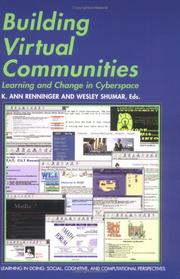
ISBN: 9780511606373 9780521780759 9780521785587 0511606370 0511040903 9780511040900 051103489X 9780511034893 0511050143 9780511050145 0521780756 0521785588 0511158262 9780511158261 0511177291 9780511177293 1107120187 1280429690 9786610429691 0511304919 Year: 2002 Publisher: New York Cambridge University Press
Abstract | Keywords | Export | Availability | Bookmark
 Loading...
Loading...Choose an application
- Reference Manager
- EndNote
- RefWorks (Direct export to RefWorks)
Building Virtual Communities examines how learning and cognitive change are fostered by online communities. Contributors to this volume explore this question by drawing on their different theoretical backgrounds, methodologies, and personal experience with virtual communities. Each chapter discusses the different meanings of the terms community, learning, and change. Case studies are included for further clarification. Together, these chapters describe the building out of virtual communities in terms that are relevant to theorists, researchers, and practitioners. The chapters provide a basis for thinking about the dynamics of Internet community building. This includes consideration of the role of the self or individual as a participant in virtual community, and the design and refinement of technology as the conduit for extending and enhancing the possibilities of community building in cyberspace. Building Virtual Communities will interest educators, psychologists, sociologists, and researchers in human-computer interaction.
Online social networks. --- Internet --- Computer networks --- Electronic social networks --- Social networking Web sites --- Virtual communities --- Social media --- Social networks --- Sociotechnical systems --- Web sites --- Social aspects. --- Electronic villages (Computer networks) --- Communets (Computer networks) --- Community networks (Computer networks) --- Free nets (Computer networks) --- Freenets (Computer networks) --- Freespaces (Computer networks) --- Telematics --- Communautés virtuelles --- Réseaux d'ordinateurs --- Aspect social --- Health Sciences --- Psychiatry & Psychology
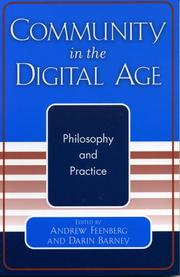
ISBN: 0742529592 9780742529595 9780742529588 0742529584 Year: 2004
Abstract | Keywords | Export | Availability | Bookmark
 Loading...
Loading...Choose an application
- Reference Manager
- EndNote
- RefWorks (Direct export to RefWorks)
Communautique --- Communauté virtuelle --- Communautés virtuelles --- Communautés électroniques --- Communets (Computer networks) --- Community networks (Computer networks) --- Cyberspace --- Electronic villages (Computer networks) --- Free nets (Computer networks) --- Freenets (Computer networks) --- Freespaces (Computer networks) --- Groupes sur Internet --- Informatique communautaire --- Lien social dans les environnements virtuels --- Rapports sociaux en réseaux --- Réseaux communautaires (Réseaux d'ordinateurs) --- Réseaux télématiques --- Socialité en réseaux --- Télématique communautaire --- Villages électroniques (Réseaux d'ordinateurs) --- Virtuele gemeenschap --- Cyberspace. --- Internet --- Cyberespace --- Social aspects. --- Aspect social --- Communautés virtuelles --- Social aspects
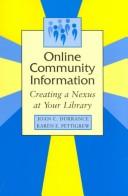
ISBN: 0838990347 0838999026 9780838999028 9780838908235 0838908233 9780838990346 9780838910429 0838910424 0838993559 0838937365 Year: 2002 Publisher: Chicago, Ill. American Library Association
Abstract | Keywords | Export | Availability | Bookmark
 Loading...
Loading...Choose an application
- Reference Manager
- EndNote
- RefWorks (Direct export to RefWorks)
Covering everything from getting to know a library's materials to marketing and promoting RA, this practical handbook will help you expand services immediately without adding costs or training time.
Readers' advisory services. --- Readers' advisory services --- Libraries and community --- Libraries and the Internet. --- Community information services --- Public libraries --- Electronic villages (Computer networks) --- Referral centers (Information services) --- Reference services (Libraries) --- Information services --- Internet and libraries --- Internet --- Information referral centers --- Referral services for information --- Information networks --- Communets (Computer networks) --- Community networks (Computer networks) --- Free nets (Computer networks) --- Freenets (Computer networks) --- Freespaces (Computer networks) --- Computer networks --- Telematics --- Reference services.
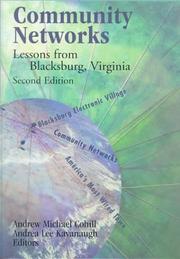
ISBN: 1580531881 9781580531887 1580530303 9781580530309 Year: 2000 Publisher: [Place of publication not identified] Artech House
Abstract | Keywords | Export | Availability | Bookmark
 Loading...
Loading...Choose an application
- Reference Manager
- EndNote
- RefWorks (Direct export to RefWorks)
Electronic villages (Computer networks) --- Community life --- Computer networks --- Telecommunications --- Electrical & Computer Engineering --- Engineering & Applied Sciences --- Communication systems, Computer --- Computer communication systems --- Data networks, Computer --- ECNs (Electronic communication networks) --- Electronic communication networks --- Networks, Computer --- Teleprocessing networks --- Data transmission systems --- Digital communications --- Electronic systems --- Information networks --- Telecommunication --- Cyberinfrastructure --- Electronic data processing --- Network computers --- Associations, institutions, etc. --- Human ecology --- Communets (Computer networks) --- Community networks (Computer networks) --- Free nets (Computer networks) --- Freenets (Computer networks) --- Freespaces (Computer networks) --- Telematics --- Technological innovations --- Social aspects --- Distributed processing --- Blacksburg Electronic Village.
Book
ISBN: 1423754514 9781423754510 Publisher: [Place of publication not identified] United Nations Publications
Abstract | Keywords | Export | Availability | Bookmark
 Loading...
Loading...Choose an application
- Reference Manager
- EndNote
- RefWorks (Direct export to RefWorks)
Rural development --- Electronic villages (Computer networks) --- Social Conditions --- Sociology & Social History --- Social Sciences --- Communets (Computer networks) --- Community networks (Computer networks) --- Free nets (Computer networks) --- Freenets (Computer networks) --- Freespaces (Computer networks) --- Computer networks --- Telematics --- Community development, Rural --- Development, Rural --- Integrated rural development --- Regional development --- Rehabilitation, Rural --- Rural community development --- Rural economic development --- Agriculture and state --- Community development --- Economic development --- Regional planning --- Electronic information resources --- Citizen participation --- Social aspects
Book
ISBN: 9782760524972 2760524973 Year: 2010 Publisher: Québec : Presses de l'Université du Québec,
Abstract | Keywords | Export | Availability | Bookmark
 Loading...
Loading...Choose an application
- Reference Manager
- EndNote
- RefWorks (Direct export to RefWorks)
Web 2.0 --- Internet --- User-generated content --- Social media --- Electronic villages (Computer networks) --- Contenu créé par l'utilisateur --- Médias sociaux --- Communautés virtuelles --- Social aspects --- Political aspects --- Aspect social --- Aspect politique --- Information society --- Information (communication) Informatie (communicatie) --- Web Web --- Internet Internet --- Communication Communicatie --- Contenu créé par l'utilisateur --- Médias sociaux --- Communautés virtuelles --- World Wide Web --- User-created content --- Electronic information resources --- User-generated media --- Communication --- DARPA Internet --- Internet (Computer network) --- Wide area networks (Computer networks) --- Communets (Computer networks) --- Community networks (Computer networks) --- Free nets (Computer networks) --- Freenets (Computer networks) --- Freespaces (Computer networks) --- Computer networks --- Telematics --- Social media. --- Social aspects. --- Web 20

ISBN: 0816647917 0816647925 9780816647910 9780816647927 0816698384 Year: 2006 Publisher: Minneapolis University of Minnesota press
Abstract | Keywords | Export | Availability | Bookmark
 Loading...
Loading...Choose an application
- Reference Manager
- EndNote
- RefWorks (Direct export to RefWorks)
Networks and computer-mediated communication now penetrate the spaces of everyday life at a fundamental level. We communicate, work, bank, date, check the weather, and fuel conspiracy theories online. In each instance, users interact with network technology as much more than a computational device. 'Cyberspaces of Everyday Life' provides a critical framework for understanding how the Internet takes part in the production of social space. Mark Nunes draws on the spatial analysis work of Henri Lefebvre to make sense of cyberspace as a social product. Looking at online education, he explores the ways in which the Internet restructures the university. Nunes also examines social uses of the World Wide Web and illustrates the ways online communication alters the relation between the global and the local. He also applies Deleuzian theory to emphasize computer-mediated communications' performative elements of spatial production. Addressing the social and cultural implications of spam and anti-spam legislation, as well as how the burst Internet stock bubble and the Patriot Act have affected the relationship between networked spaces and daily living, 'Cyberspaces of Everyday Life' sheds new light on the question of virtual space and its role in the offline world. Mark Nunes is associate professor and chair of the humanities department at Georgia Perimeter College, Clarkston Campus.
Cyberspace. --- Electronic villages (Computer networks). --- Social networks. --- Telematics. --- Cyberspace --- Electronic villages (Computer networks) --- Social networks --- Telematics --- 82:62 --- 82:659.3 --- 82:659.3 Literatuur en massacommunicatie --- Literatuur en massacommunicatie --- 82:62 Literatuur en technologie --- Literatuur en technologie --- CMC systems --- Computer-mediated communication --- Telecommunication --- Networking, Social --- Networks, Social --- Social networking --- Social support systems --- Support systems, Social --- Interpersonal relations --- Cliques (Sociology) --- Microblogs --- Communets (Computer networks) --- Community networks (Computer networks) --- Free nets (Computer networks) --- Freenets (Computer networks) --- Freespaces (Computer networks) --- Computer networks --- Space and time --- Computers
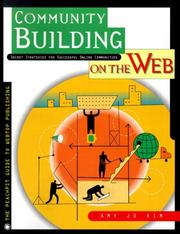
ISBN: 0201874849 Year: 2000 Publisher: Berkeley, CA Peachpit Press
Abstract | Keywords | Export | Availability | Bookmark
 Loading...
Loading...Choose an application
- Reference Manager
- EndNote
- RefWorks (Direct export to RefWorks)
Community life --- Electronic villages (Computer networks). --- Internet --- Web sites --- Technological innovations. --- Social aspects. --- Design. --- Electronic villages (Computer networks) --- #SBIB:309H103 --- #SBIB:309H1713 --- #SBIB:309H03 --- 316.47 --- 316.47 Sociale relaties --(sociologie) --- Sociale relaties --(sociologie) --- Web site development --- Microformats --- Associations, institutions, etc. --- Human ecology --- Communets (Computer networks) --- Community networks (Computer networks) --- Free nets (Computer networks) --- Freenets (Computer networks) --- Freespaces (Computer networks) --- Computer networks --- Telematics --- Technological innovations --- Design --- Social aspects --- Mediatechnologie / ICT / digitale media: sociale en culturele aspecten --- Mediatechnologie: nieuwe toepassingen (abonnee-televisie, electronic mail, desk top publishing, virtuele realiteit...) --- Systeemtheorie: cybernetica systeemleer, mathematische informatietheorie --- Authorship
| Listing 1 - 10 of 19 | << page >> |
Sort by
|

 Search
Search Feedback
Feedback About UniCat
About UniCat  Help
Help News
News